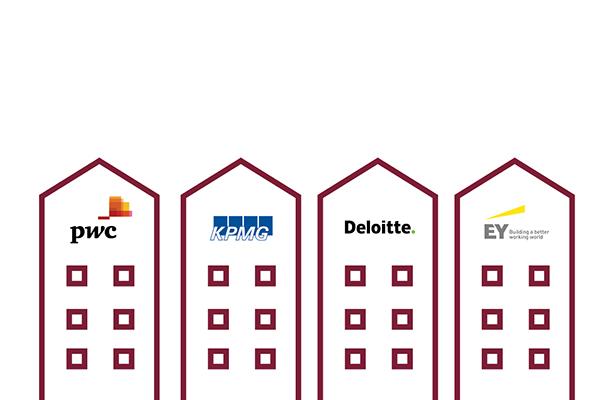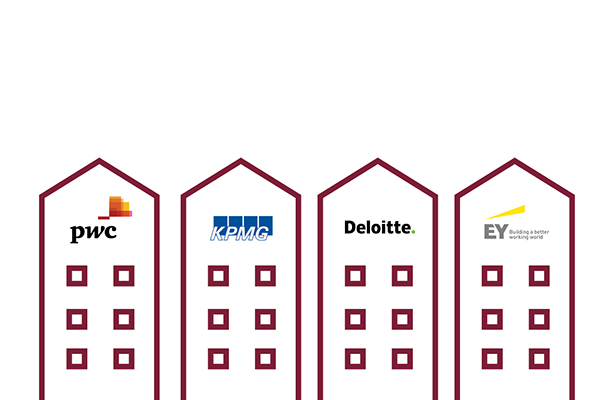
After an aborted foray into the legal sector in the 1990s, accounting firms are back for a second attempt, and this time they mean business. And China is clearly in their sights.
The last time that accounting firms were making advances into the legal sector was about a generation ago – the 1990s, to be precise. Led by Arthur Andersen, they looked to diversify from auditing and tax by expanding into both consulting and law, and they might even have succeeded if the Enron scandal hadn’t taken down Andersen in 2002.
Fast forward to the 2010s, and the accounting firms are on the prowl again for lucrative legal work. This time, they might be here to stay.
“The return of the Big Four started in about 2010. What drove the return was the fact that clients didn’t want just an accounting solution or a legal solution; they wanted a business solution. They wanted their advisers to be more business-oriented,” says Lachlan Wolfers, the legal head of KPMG China.
The Big Four have historically focused on practices that complement their existing services and have made inroads into legal practice areas like tax, labor and employment, and immigration. They are increasingly branching out into M&A, where they can provide clients with a “one-stop shop” for smaller and less complex deals.
In the past decade, the Big Four have been re-building and strengthening their legal networks. And in the past year, they have been gaining serious momentum in China. Rui Bai Law Firm in Beijing and Xin Bai Law Firm in Shanghai became member firms of the PwC global network about four years ago, while Tiang & Co., a law firm associated with PwC Legal International Pte Ltd (a licensed Foreign Law Practice) in Singapore, was established in Hong Kong last year. EY added EY Law Firm as a member of its global network in Shanghai, Beijing and Hong Kong, to go with EY Attorneysat-Law in Taiwan. Qin Li Law Firm is a Shanghai-based member of the Deloitte Legal global network. And KPMG is this year setting up affiliated law firms in Shanghai and Hong Kong.
According to a survey report, many of the Big Four are highly focused on growth in Asia, especially in China. Since the beginning of 2016, 45 percent of the Big Four’s legal hires have been in Asia. Recently, EY Law Firm and its Hong Kong associated firm snapped up six lawyers from Troutman Sanders’ recently closed Asia offices, while Tiang & Co. is rapidly expanding in Hong Kong.
NATURAL EXTENSION
The popular perception is that the Big Four’s legal expansion is happening due to the fact that revenues from their audit and tax divisions are flatlining. However, the accounting firms say that legal services perfectly complement tax and other advisory services, and thus are a natural extension.
“We remain as an independent PRC law firm and offer legal services independently.” says Lin Zhong, a partner at EY Law Firm. “If a team can provide a client with multidisciplinary solutions to each issue in a transaction, then this is a win-win scenario for all involved.”
The Big Four are taking over low value-added tasks from law firms, which increasingly cater to today’s costconscious clients who value efficiency and standardization.
Additionally, their strategy is to deploy technology in the delivery of legal services where possible so that they are modernising how services are delivered. “Our aim is to redefine what the modern lawyer does and look like, so we’re trying to redefine the skills of modern lawyer,” says Wolfers.
So how alarmed should law firms feel? Bill Ye, a tax partner at King & Wood Mallesons, says that the Big Four are in a pivotal position to win cross-border deals thanks to their global footprint. However, Joseph Tse, a partner at Tiang & Co., feels the threat is overstated. “We don’t see the competition as a zero-sum game. We’re trying to fill a gap in the market, as there is increasing demand by clients for a total business solution,” he says. “The competition is not one between the Big Four and law firms, but one between those players in the legal sector who can adapt, and those who can’t.”
This is echoed by Lin Zhong: “The existential threat to traditional law firms may not be the law members of Big Four network after all. We all need to evolve in the face of change.”
While the Big Four continue to grow, law firms are yet to put in place specific strategies to cope with the threat. “Law firms will have to pay if they miss the wake-up call,” says Ye. He points out two areas of risk for law firms: One, instead of dealing with in-house counsel, the Big Four can access the C-suite directly, offering to bundle legal work with their audit, consulting and tax offering. Two, many smaller Chinese law firms don’t always place compliance as a priority for the performance pressure, unlike the Big Four. This means the firms and lawyers may probably assume higher professional liability risks in the future.
AREAS OF OVERLAP
As the Big Four look to build on their traditional auditing role to becoming globally integrated business solution providers, law firms are also seeking to mimic the Big Four’s deep proficiency in project, process and price management. Tse feels that the two sides could increasingly converge, driven by clients’ demands of “more for less.” “The greatest opportunity is also the greatest challenge,” says Wolfers. “Both of us are thinking about how to best combine the natural skills and advantages of both groups.”
Ye adds, “It would be convenient to say that clients remain highly skeptical of the Big Four’s ability to provide complex legal services. But in today’s tech-driven market -- take blockchain as an example -- the Big Four have made much progress on its implications, questions, opportunities and risks, while many law firms are still in the figuring-out stage. The gap between the two regarding complex legal services should not be overstated either.”



